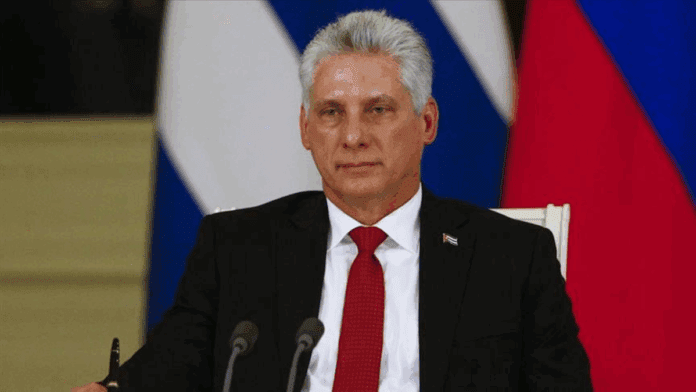The United States government has imposed sanctions on Cuban President Miguel Díaz-Canel and several other senior officials. This action comes exactly three years after the historic July 11 and 12, 2021 protests, the largest demonstrations seen in Cuba in decades.
The protests began in response to power outages, food shortages, and growing frustration among Cuban citizens. Thousands of people took to the streets in cities across the island, including Havana. These were not organized by opposition groups but were spontaneous actions led by ordinary Cubans.
In the days that followed, the Cuban government responded with a tough crackdown. Reports from human rights organizations said more than 1,000 people were arrested. Some were accused of crimes such as vandalism or public disorder. Others faced more serious charges like sabotage. Many were given long prison sentences. According to advocacy group 11J, over 550 people were still serving sentences related to the protests as of late last year.
Some protesters were granted conditional release earlier this year after a special appeal by Pope Francis. But hundreds remain behind bars, drawing international criticism.
US Secretary of State Marco Rubio Announces Sanctions
To mark the third anniversary of the protests, U.S. Secretary of State Marco Rubio posted on social media platform X (formerly Twitter), stating that the U.S. would impose visa restrictions on Cuban judicial and prison officials. These individuals are believed to be “responsible for, or complicit in, the unjust detention and torture” of those who protested peacefully in 2021.
???? U.S. slams sanctions on North Korea’s fake job ring funding missile programs
Rubio emphasized that the U.S. stands with the people of Cuba. He stated that the US will keep defending the human rights and basic freedoms of the Cuban people and send a clear message that illegitimate, dictatorial regimes have no place in the region.
Alongside President Díaz-Canel, the U.S. has imposed sanctions on Defense Minister Álvaro López Miera and Interior Minister Lázaro Álvarez Casas. These leaders are now subject to travel bans and potential financial penalties.
According to the U.S. State Department, these sanctions are part of a broader effort to support human rights and punish governments that use violence or unfair legal systems to silence their citizens. The visa bans prevent targeted individuals from entering the United States.
The move also reflects a return to a tougher U.S. stance on Cuba, similar to policies from the Trump administration. While the Biden administration had taken a slightly more cautious approach in the past, the latest actions show increased pressure on the Cuban government.
Strong Response from Cuban Officials
The Cuban government reacted angrily to the U.S. sanctions. Johana Tablada, deputy director of the U.S. department in Cuba’s Foreign Ministry, sharply criticized Marco Rubio. She called him a “defender of genocide, prisons and mass deportations,” and accused the U.S. of trying to destabilize Cuba through its policies and media campaigns.
Cuban officials continue to claim that the 2021 protests were not a grassroots movement, but rather the result of foreign influence and U.S. pressure. They have long blamed U.S. sanctions for the country’s economic crisis, saying these restrictions have harmed ordinary Cubans more than the government.
Despite the government’s statements, international human rights groups have condemned the Cuban response to the protests. These organizations argue that peaceful demonstrators should never face long jail sentences, especially for speaking out about conditions in their own country.
In 2022, Cuban prosecutors said that 790 people were investigated in connection with the July protests. Some of those were minors or first-time offenders. The lack of transparency and the severity of the punishments have raised ongoing concerns from global watchdog groups.
For many families in Cuba, the impact of the protests and the government’s reaction continues to be deeply felt. Loved ones remain in jail, and the country’s economic and social struggles remain unresolved.
